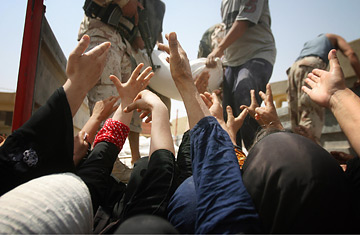
Iraqi women reach out to receive humanitarian aid.
A new tool to evaluate governments' humanitarian spending can help countries get aid out more efficiently to those who need it, say former U.N. Secretary-General Kofi Annan and the Spain-based non-profit DARA. Their Humanitarian Response Index (HRI), launched Thursday in London, ranks Sweden as the world leader in humanitarian aid. Norway comes second, followed by Denmark, the Netherlands and the European Commission. The U.S. scores a lowly 16th out of 23. (See the full rankings below).
Surprised at the findings? The index is less about total funding (although, per capita, the U.S. is no world leader by that measure either), and more about how well aid dollars reach their beneficiaries. The index ranks 22 developed countries and the European Commission on how consistently each adheres to guidelines they all approved in 2003, the Principles and Good Practice of Humanitarian Donorship.
Those principles, among other things, enshrine the goals of humanitarian aid as alleviating suffering according to need, irrespective of political goals, and in a way that supports long-term development. The index weighs 57 indicators, 25 from hard data and 32 from a survey among several hundred field workers (asking, for example, whether donors collaborate well with non-profits and businesses). In short, the index reviews how well countries are following their own global donor guidelines. "If you take the top from the bottom, there are big differences," says Silvia Hidalgo, DARA director, and co-author of the report. Sweden is this year's clear winner, first in a stunning 19 of the 57 categories, because it gives funds quickly, in cash, and follows up predictably as long as projects pass their regular parliamentary reviews.
For the U.S., a mediocre ranking reflects mixed performance. While funding is allocated relatively well along international guidelines, much of the country's aid is tightly earmarked for specific projects or comes as physical goods instead of cash — fine for those projects, but a big constraint on how recipients can respond to emergencies and unplanned events. The U.S. scores high grades collaborating with non-profit organizations, and excellent grades promoting accountability — second only to the E.U. But it's bottom of the pack in implementing international humanitarian and human rights laws, having refused to ratify key international treaties. Survey responses — though generally more favorable to the U.S. than the hard-data indicators — also rank U.S. aid lowest in perceptions of "neutrality" and "independence" from political and strategic considerations.
The index creators insist their device is not intended as a "name and shame exercise," but rather as "an incentive" to do better. "Benchmarking works through peer pressure to motivate actors to improve efficiency, correct deficiencies in the policy framework and possibly even avert damage to a country's reputation," write the HRI report authors. After all, these countries have all agreed on the principles on which they're being assessed. As Annan tells reporters in London — he's now president of the Global Humanitarian Forum in Geneva — "Only promises kept are promises that matter."
Humanitarian Response Index 2007 rankings:
1. Sweden
2. Norway
3. Denmark
4. Netherlands
5. European Commission
6. Ireland
7. Canada
8. New Zealand
9. United Kingdom
10. Switzerland
11. Finland
12. Luxembourg
13. Germany
14. Australia
15. Belgium
16. United States
17. Spain
18. Japan
19. France
20. Austria
21. Portugal
22. Italy
23. Greece
